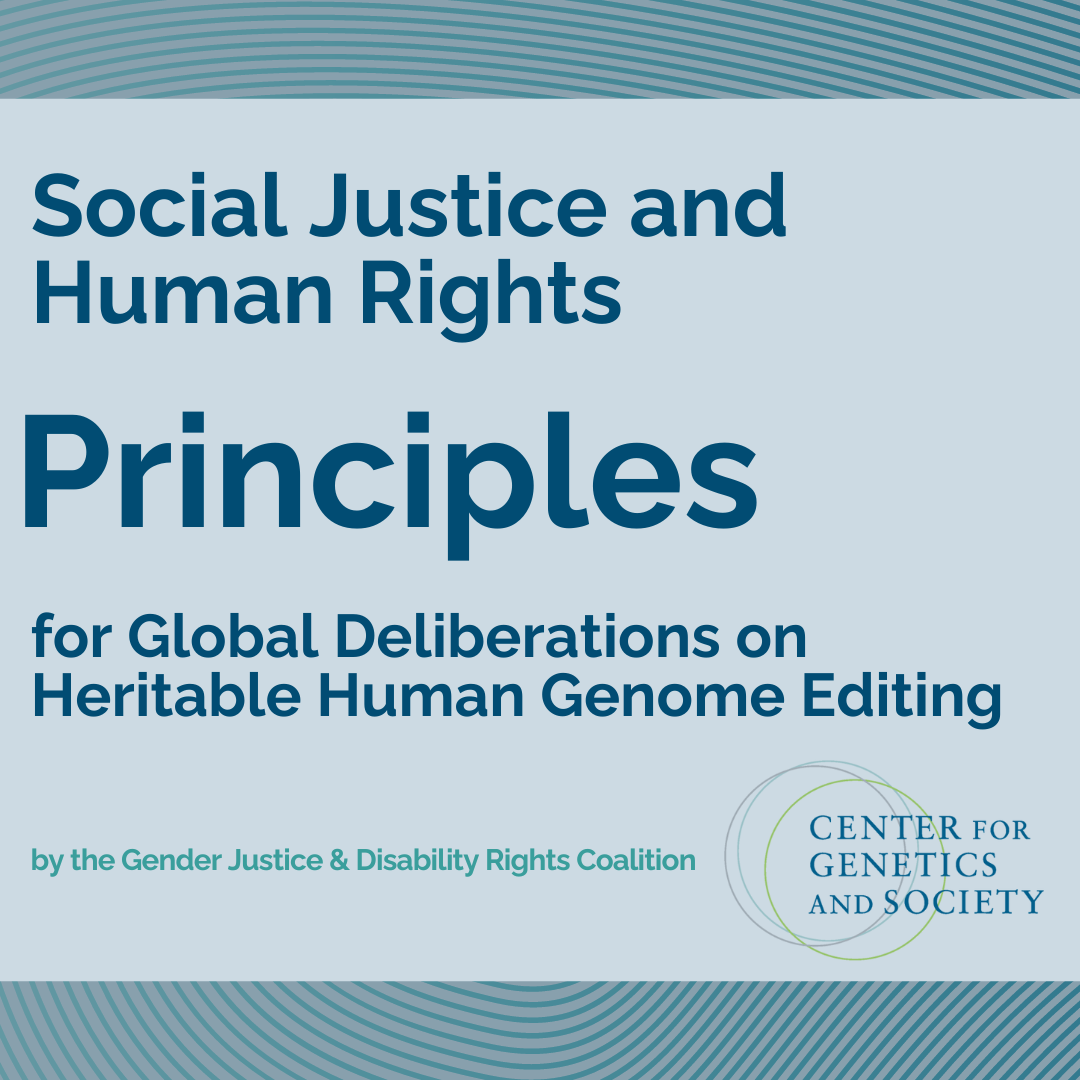Groundbreaking principles on heritable genome editing bring social justice voices to the fore

Update, June 27, 2024: Spanish and German translations of the Social Justice and Human Rights Principles for Global Deliberations on Heritable Genome Editing are available.
CGS’ Gender Justice and Disability Rights Coalition has just released Social Justice and Human Rights Principles for Global Deliberations on Heritable Genome Editing. The Principles explicitly center gender justice, disability rights, and human rights in deliberations addressing heritable genome editing, an arena that has largely been the purview of scientists and bioethicists. The Principles have been endorsed by more than 70 individuals and organizations from around the world.
Heritable genome editing – using CRISPR or other tools to alter the DNA of embryos or gametes in order to create genetically modified children – is prohibited by scores of countries and an international treaty, yet continues to be debated and even promoted in some influential circles.
The new Principles go beyond concerns about safety and medical ethics to encompass a range of social justice and human rights issues. They prioritize women and pregnant people's health, rights, and freedom from exploitation and affirm the full inclusion and worth of people with disabilities. They also foreground racial, LGBTQ+, economic, intergenerational, and environmental justice and Indigenous sovereignty.
Silvia Yee, Public Policy Director at Disability Rights Education and Defense Fund (DREDF), an organizational member of the Coalition, applauds the Principles for valuing the lives of people with disabilities and their inclusion in any decisions regarding this technology. “People with disabilities have always existed and have always fought to be recognized as fully human, having equal dignity and worth as those without disabilities. Over decades, we have slowly achieved enforceable legal rights, a broader recognition of ableism and implicit disability bias, and a discernible presence in our communities all around the world.”
Yee continued, “A key question for the disability community now is whether we have gained enough ground in our fight to be able to resist the latest promise to ‘advance humanity’ through the use of heritable genome editing. This technology sells itself through promising the elimination of disability, undermining efforts to change the many environmental conditions that make it hard to live with disability. DREDF supports the new Principles because they give us an alternative vision of a truly inclusive process for considering genetic manipulation that does not shut out or devalue people with disabilities and other directly affected populations.”
Larkin Taylor-Parker, Legal Director of the Autistic Self Advocacy Network (ASAN), another organizational member of the Coalition, echoes Yee’s comments and emphasizes the eugenic nature of this technology. “Promoting the development of heritable human genome editing reinforces societal stigma about disability and bolsters eugenic beliefs that our world is better off without people with disabilities. Instead, we should recognize the inherent worth and dignity of people with disabilities and harness resources to create environments where people of all abilities can participate fully.”
The Gender Justice and Disability Rights Coalition calls on governments to prioritize social justice and human rights in any policies related to this technology. The eleven principles are based in intersectional social justice perspectives and intended to guide public engagement and policy making on heritable genome editing.
Endorsers of the Principles illuminate the importance of addressing the topic of heritable genome editing within social justice movements. “Heritable genome editing is a reproductive justice issue,” said Onyemma Obiekea, Policy Director for Black Women for Wellness and Black Women for Wellness Action Project, both of which are organizational endorsers of the Principles. “Development of this technology would only be possible on the backs of women and pregnant people. Its implications stand only to continue a devastating legacy of reproductive oppression. The new Principles offer guidance towards an equitable and liberated future, calling on governments and society to choose a different path.”
Abril Saldaña Tejeda, Associate Professor of Sociology at the University of Guanajuato, Mexico and a member of the Coalition, highlights the necessity of Global South voices in addressing the prospect of heritable genome editing. “Governance of new technologies implies recognizing a power imbalance in the global geographies of knowledge. Narratives of scientific progress from the Global North have historically enabled colonial violence against Global South countries, resulting in ethical concerns about human life and reproduction that vary across countries. The Global South—scientists and non-scientists alike—must be part of the debates over the future of human genome editing.”
The Gender Justice and Disability Rights Coalition on Heritable Genome Editing, which developed the Principles, is an international group of 16 scholars, advocates, and organizations from 10 countries. The Coalition was launched as part of CGS’ commitment to UN Women’s Generation Equality Forum. The Coalition’s objectives include developing principles, model policies, and tools for advocacy that center gender, reproductive, and disability justice in public deliberations and policy making on heritable genome editing.
Read the full text of the Social Justice and Human Rights Principles for Global Deliberations on Heritable Human Genome Editing. A summary version is also available.



